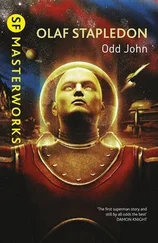Olaf Stapledon - The Complete Sci-Fi Works of Olaf Stapledon
Здесь есть возможность читать онлайн «Olaf Stapledon - The Complete Sci-Fi Works of Olaf Stapledon» — ознакомительный отрывок электронной книги совершенно бесплатно, а после прочтения отрывка купить полную версию. В некоторых случаях можно слушать аудио, скачать через торрент в формате fb2 и присутствует краткое содержание. Жанр: unrecognised, на английском языке. Описание произведения, (предисловие) а так же отзывы посетителей доступны на портале библиотеки ЛибКат.
- Название:The Complete Sci-Fi Works of Olaf Stapledon
- Автор:
- Жанр:
- Год:неизвестен
- ISBN:нет данных
- Рейтинг книги:5 / 5. Голосов: 1
-
Избранное:Добавить в избранное
- Отзывы:
-
Ваша оценка:
- 100
- 1
- 2
- 3
- 4
- 5
The Complete Sci-Fi Works of Olaf Stapledon: краткое содержание, описание и аннотация
Предлагаем к чтению аннотацию, описание, краткое содержание или предисловие (зависит от того, что написал сам автор книги «The Complete Sci-Fi Works of Olaf Stapledon»). Если вы не нашли необходимую информацию о книге — напишите в комментариях, мы постараемся отыскать её.
Novels:
Last and First Men: A Story of the Near and Far Future
Last Men in London
Odd John: A Story Between Jest and Earnest
Star Maker
Darkness and the Light
Sirius: A Fantasy of Love and Discord
Death into Life
Short Stories:
The Flames (1947)
The Seed and the Flower
The Road to the Aide Post
A Modern Magician
East is West
A World of Sounds
Arms Out of Hand
The Complete Sci-Fi Works of Olaf Stapledon — читать онлайн ознакомительный отрывок
Ниже представлен текст книги, разбитый по страницам. Система сохранения места последней прочитанной страницы, позволяет с удобством читать онлайн бесплатно книгу «The Complete Sci-Fi Works of Olaf Stapledon», без необходимости каждый раз заново искать на чём Вы остановились. Поставьте закладку, и сможете в любой момент перейти на страницу, на которой закончили чтение.
Интервал:
Закладка:
The vast corpus of Martian knowledge had taken many thousands of years to grow. All its stages, and its current achievements, were recorded on immense scrolls of paper made from vegetable pulp, and stored in libraries of stone. For the Martians, curiously enough, had become great masons, and had covered much of their planet with buildings of feathery and toppling design, such as would have been quite impossible on earth. They had no need of buildings for habitation, save in the arctic regions; but as workshops, granaries, and store rooms of all sorts, buildings had become very necessary to the Martians. Moreover these extremely tenuous creatures took a peculiar joy in manipulating solids. Even their most utilitarian architecture blossomed with a sort of gothic or arabesque ornateness and fantasy, wherein the ethereal seemed to torture the substance of solid rock into its own likeness.
At the time of the invasion, the Martians were still advancing intellectually; and, indeed, it was through an achievement in theoretical physics that they were able to leave their planet. They had long known that minute particles at the upper limit of the atmosphere might be borne into space by the pressure of the sun’s rays at dawn and sunset. And at length they discovered how to use this pressure as the wind is used in sailing. Dissipating themselves into their ultra-microscopic units, they contrived to get a purchase on the gravitational fields of the solar system, as a boat’s keel and rudder get a purchase on the water. Thus they were able to tack across to the earth as an armada of ultra-microscopic vessels. Arrived in the terrestrial sky, they re-formed themselves as cloudlets, swam through the dense air to the alpine summit, and climbed downwards, as a swimmer may climb down a ladder under water.
This achievement involved very intricate calculations and chemical inventions, especially for the preservation of life in transit and on an alien planet. It could never have been done save by beings with far-reaching and accurate knowledge of the physical world. But though in respect of ‘natural knowledge’ the Martians were so well advanced, they were extremely backward in all those spheres which may be called ‘spiritual knowledge’. They had little understanding of their own mentality, and less of the place of mind in the cosmos. Though in a sense a highly intelligent species, they were at the same time wholly lacking in philosophical interest. They scarcely conceived, still less tackled, the problems which even the First Men had faced so often, though so vainly. For the Martians there was no mystery in the distinction between reality and appearance or in the relation of the one and the many, or in the status of good and evil. Nor were they ever critical of their own ideals. They aimed whole-heartedly at the advancement of the Martian super-individual. But what should constitute individuality, and its advancement, they never seriously considered. And the idea that they were under obligation also towards beings not included in the Martian system of radiation, proved wholly beyond them. For, though so clever, they were the most naïve of self-deceivers, and had no insight to see what it is that is truly desirable.
4. DELUSIONS OF THE MARTIANS
Table of Contents
To understand how the Martians tricked themselves, and how they were finally undone by their own insane will, we must glance at their history.
The civilized Martians constituted the sole remaining variety of a species. That species itself, in the remote past, had competed with, and exterminated, many other species of the same general type. Aided by the changing climate, it had also exterminated almost all the species of the more terrestrial kind of fauna, and had thereby much reduced the vegetation which it was subsequently to need and foster so carefully. This victory of the species had been due partly to its versatility and intelligence, partly to a remarkable zest in ferocity, partly to its unique powers of radiation and sensitivity to radiation, which enabled it to act with a coordination impossible even to the most gregarious of animals. But, as with other species in biological history, the capacity by which it triumphed became at length a source of weakness. When the species reached a stage corresponding to primitive human culture, one of its races, achieving a still higher degree of radiant intercourse and physical unity, was able to behave as a single vital unit; and so it succeeded in exterminating all its rivals. Racial conflict had persisted for many thousands of years, but as soon as the favoured race had developed this almost absolute solidarity of will, its victory was sweeping, and was clinched by joyous massacre of the enemy.
But ever afterwards the Martians suffered from the psychological effects of their victory at the close of the epoch of racial wars. The extreme brutality with which the other races had been exterminated conflicted with the generous impulses which civilization had begun to foster, and left a scar upon the conscience of the victors. In self-defence they persuaded themselves that since they were so much more admirable than the rest, the extermination was actually a sacred duty. And their unique value, they said, consisted in their unique radiational development. Hence arose a gravely insincere tradition and culture, which finally ruined the species. They had long believed that the physical basis of consciousness must necessarily be a system of units directly sensitive to ethereal vibrations, and that organisms dependent on the physical contact of their parts were too gross to have any experience whatever. After the age of the racial massacres they sought to persuade themselves that the excellence, or ethical worth, of any organism depended upon the degree of complexity and unity of its radiation. Century by century they strengthened their faith in this vulgar doctrine, and developed also a system of quite irrational delusions and obsessions based upon an obsessive and passionate lust in radiation.
It would take too long to tell of all these subsidiary fantasies, and of the ingenious ways in which they were reconciled with the main body of sane knowledge. But one at least must be mentioned, because of the part it played in the struggle with man. The Martians knew, of course, that ‘solid matter’ was solid by virtue of the interlocking of the minute electro-magnetic systems called atoms. Now rigidity had for them somewhat the same significance and prestige that air, breath, spirit, had for early man. It was in the quasi-solid form that Martians were physically most potent; and the maintenance of this form was exhausting and difficult. These facts combined in the Martian consciousness with the knowledge that rigidity was after all the outcome of interlocked electro-magnetic systems. Rigidity was thus endowed with a peculiar sanctity. The superstition was gradually consolidated, by a series of psychological accidents, into a fanatical admiration of all very rigid materials, but especially of hard crystals, and above all of diamonds. For diamonds were extravagantly resistant; and at the same time, as the Martians themselves put it, diamonds were superb jugglers with the ethereal radiation called light. Every diamond was therefore a supreme embodiment of the tense energy and eternal equilibrium of the cosmos, and must be treated with reverence. In Mars, all known diamonds were exposed to sunlight on the pinnacles of sacred buildings; and the thought that on the neighbour planet might be diamonds which were not properly treated, was one motive of the invasion.
Thus did the Martian mind, unwittingly side-tracked from its true development, fall sick, and strive ever more fanatically towards mere phantoms of its goal. In the early stages of the disorder, radiation was merely regarded as an infallible sign of mentality, and radiative complexity was taken as an infallible measure, merely, of spiritual worth. But little by little, radiation and mentality failed to be distinguished, and radiative organization was actually mistaken for spiritual worth.
Читать дальшеИнтервал:
Закладка:
Похожие книги на «The Complete Sci-Fi Works of Olaf Stapledon»
Представляем Вашему вниманию похожие книги на «The Complete Sci-Fi Works of Olaf Stapledon» списком для выбора. Мы отобрали схожую по названию и смыслу литературу в надежде предоставить читателям больше вариантов отыскать новые, интересные, ещё непрочитанные произведения.
Обсуждение, отзывы о книге «The Complete Sci-Fi Works of Olaf Stapledon» и просто собственные мнения читателей. Оставьте ваши комментарии, напишите, что Вы думаете о произведении, его смысле или главных героях. Укажите что конкретно понравилось, а что нет, и почему Вы так считаете.












